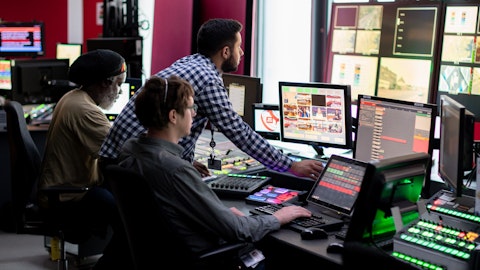John Hodulik: Great. Maybe getting back to the sports theme, where viewership remains strong, I’d say, across the board. I mean First of all, how would you gauge the success of the USFL? Second, anything you could tell us about your appetite for additional sports rights, especially to fill in the summer months? And then how does the sort of relative weighting on sports versus entertainment programming position you guys given what could be a protracted writer strike?
Lachlan Murdoch: Thanks, John. Look, USFL, it’s still — it’s just the start of the second season. We’re very pleased with it. We’re pleased with both its ratings, the quality of the games, its performance on television and ratings. And also, frankly, it’s a performance on the ground with ticket sales and engagement with football fans. So early days, but we couldn’t be more happy with it — with how it’s tracking today. In terms of additional sports rights, we look across our portfolio of sports rights. We’re constantly managing them. We look at sports rights as they come up. And we also look at them as they get renewed just to make sure that they are efficient for us and that we’re paying a responsible and appropriate amount for those rights.
So we’re constantly adjusting, but we do it with, I think, a real commitment to discipline in terms of what rights we would acquire or dispose of. So it’s a moving — it’s always a moving feast, but I wouldn’t expect anything dramatic at all in that area. What was the last question? The writer strike. So thank you. On the writer strike, look, I think for us, we are well positioned for the writer strike. We think that with our strategic priorities and sort of strengths in sports but also in news, these are 2 areas that are not affected by the writer strike. And the audience will pivot on a — when they’re watching television to those categories. In entertainment, you have to remember as well, we only program 2 hours of entertainment at night.
That’s a mixture of both scripted and unscripted content. So we feel very well positioned there with that not to be affected by the writer strike really at all. There’ll be some scheduling changes with some of this descriptive content, but it’s not something that’ll have a significant financial impact on us.
Operator: And that last question will come from the line of Jessica Reif Ehrlich with Bank of America.
Jessica Reif Ehrlich : I just wanted to maybe follow-up on Lachlan’s last point that you’re not overly dependent on live and unscripted — I mean, given you’re live and unscripted, you’re not overly dependent on the writers for entertainment. So given that, like, can you talk about your outlook for the upfront, also given macro, I mean, you seem to be in a very different position than most people, but the market is, most people say choppy, and then also given the decline in the paid TV universe. Can you just talk about how you see FOX News and sports transitioning over time?
Lachlan Murdoch : So look, I agree with you on the writer strike. I think for us, our focus on sort of live, live news, live sports, and frankly, the network a healthy balance of scripted and unscripted content on the network puts us in a tremendous position. I think what it — the timing of the strike, obviously with the upfronts next week creates some what’s the word I’m hesitancy of? It’s hard to present an exact schedule, right? I you’re only in entertainment, it’s not if you’re in news and sport. So I think it positions us very well in the upfront. And that’s, of course, as I mentioned before not including the strength of Tubi going to this upfront as well. And Tubi will certainly be front and center in all of our upfront presentations, but also in our negotiations going forward.





